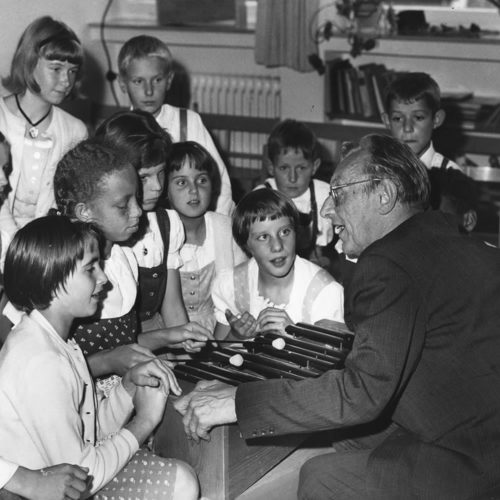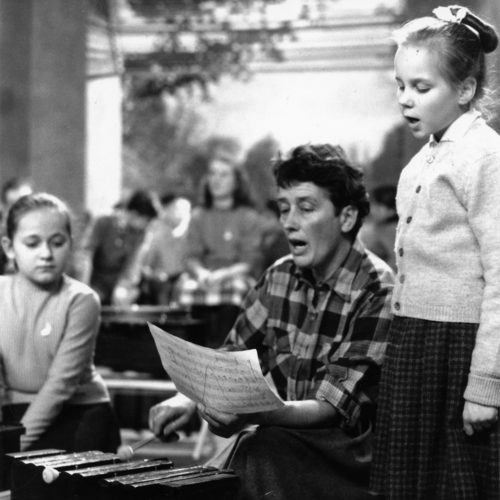The summer of 2019 saw the 28th and final year of Orff Schulwerk teacher certification during Eastman’s summer session. A recent article by Music Education graduate Stephania Romaniuk E’20 (MA) traces the beginnings of the Orff programs in 1920s Germany to their adoption and flourishing at Eastman. This is Part One; click here to read Part Two.
PART ONE
By Stephania Romaniuk
On July 26, 2019, under director Dr. Donna Brink Fox, and faculty members Jim Solomon, Mary Helen Solomon, Dr. Janet Robbins, and Karen Medley, the Orff Schulwerk Teacher Education Course at Eastman graduated its final cohort of ambitious music educators seeking certified instruction in the Orff approach.
Over 28 consecutive summers, the program accepted 976 total registrations across three certification levels, serving 582 students from the United States, Canada, Brazil, Taiwan, and beyond. By the final year, students of previous years’ participants who had themselves decided to pursue careers as music educators had even begun attending to gain their Orff certification levels.
Faculty at the summer Orff Schulwerk Teacher Education program taught music educators the philosophy and approach to music instruction developed by composer and pedagogue Carl Orff (1895–1982). Orff felt that a child’s musical imagination could be awakened by what he termed elemental music—music that was accessible, characteristically rhythmic, repetitive, dramatic, united with speech and movement, and with simple forms.
Over week-long sessions, educators sang, spoke, moved, danced, played instruments, improvised, read music, arranged, and composed, and learned to appropriately sequence these learning activities in their own classrooms. As instructor Jim Solomon explained: “Orff is not a series of gimmicks or techniques… It is a multidimensional, multi-sensory approach … and an all-inclusive philosophy that seeks to reach the ‘whole child.’”
The story of Orff Schulwerk Teacher Education goes back to Orff’s work in Germany in the 1920s. During the era of Dalcroze, Laban, and the flourishing of modern dance, Orff began teaching an evening course primarily for young women interested in music, improvisation, and dance instruction. Orff worked with dancer and choreographer Dorothee Günther to cultivate in students a united musical expression, centered in rhythm, repetition, and simple forms, and eventually incorporated marimbas, xylophones, timpani, and other percussive instruments into instruction.
Their work quickly gained in popularity, and together with his pupil Gunild Keetman and the school accompanist Hans Bergese, Orff published several volumes of elemental music exercises (Orff-Schulwerk). By 1945, however, as a result of bombing during World War II, the Güntherschule building where they had been teaching lay in ruins.
Gunild Keetman in the radio series Müsik fur Kinder, 1957 (Photo credit: Peter Reimer OZM, found here: https://www.orff.de/en/orffr-schulwerk/development/)
After the war, a Bavarian radio station invited Orff to develop a series of music education broadcasts for elementary students. Orff and Keetman recast the Schulwerk for children, and Musik für Kinder was born. Thanks in large part to the efforts of Arnold Walter, a Czech lawyer and musicologist who later became the director of the faculty of music at the University of Toronto, and his student, Doreen Hall, the Schulwerk was translated and adapted for North American English-speaking music teachers, eventually appearing at the 1956 Music Educators National Conference in St. Louis.
Hall went on to advocate for the approach in North America, and one of her students, Ruth Pollock Hamm, began offering workshops and courses in the Orff approach at Eastman beginning in the summer of 1966. Hamm became a founding member of the Orff-Schulwerk Association, now the American Orff Schulwerk Association (AOSA), and, in 1970, Rochester was the third AOSA chapter to receive its charter.
In Part Two: Orff Schulwerk teacher education develops at Eastman in the 1990s and 2000s.
Stephania Romaniuk received her Master of Arts degree in Music Education from Eastman this year.


